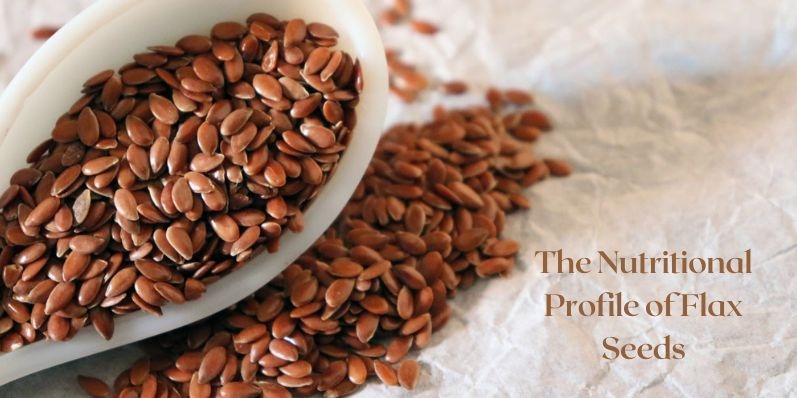
13-09-2023
The Nutritional Profile of Flax Seeds
- Admin
Flax seeds, also known as linseeds, have gained immense popularity in recent years as a superfood due to their impressive nutritional profile and numerous health benefits. These tiny, brown, or golden seeds are packed with essential nutrients, making them a valuable addition to any diet. In this comprehensive exploration of flax seeds' nutritional content, we'll delve into the remarkable array of vitamins, minerals, and other bioactive compounds that make them a nutritional powerhouse.
Macronutrients
Flax seeds are renowned for their high content of healthy fats, primarily in the form of polyunsaturated fatty acids (PUFAs). The most prominent PUFA in flax seeds is alpha-linolenic acid (ALA), which is an omega-3 fatty acid. Just one tablespoon of ground flax seeds can provide approximately 1.8 grams of ALA, contributing significantly to your daily omega-3 intake.
In addition to fats, flax seeds are a good source of both soluble and insoluble dietary fiber. This fiber content aids in digestion, helps regulate blood sugar levels, and promotes a feeling of fullness, making flax seeds an excellent choice for those looking to manage their weight.
Protein
Flax seeds are a respectable source of plant-based protein, making them particularly attractive to vegetarians and vegans. They contain all nine essential amino acids, which are the building blocks of proteins, and provide around 1.5 grams of protein per tablespoon.
Vitamins
Flax seeds are rich in several essential vitamins, including:
Vitamin B1 (Thiamine): This vitamin is crucial for converting food into energy and maintaining proper nerve function.
Vitamin B6 (Pyridoxine): Essential for brain development and function, as well as immune system support.
Folate (Vitamin B9): Important for DNA synthesis and repair, making it essential during pregnancy.
Vitamin E (Tocopherol): An antioxidant that helps protect cells from oxidative damage.
Minerals
Flax seeds are a valuable source of essential minerals, including:
Magnesium: Critical for muscle and nerve function, blood glucose control, and bone health.
Phosphorus: Necessary for strong bones and teeth, as well as cell growth and repair.
Copper: Supports the formation of red blood cells and aids in iron absorption.
Manganese: Helps in bone development, blood clotting, and inflammation reduction.
Selenium: An essential trace mineral with antioxidant properties that help protect against cell damage.
Phytonutrients
Flax seeds are loaded with phytonutrients, such as lignans, which have powerful antioxidant properties. Lignans are associated with a reduced risk of chronic diseases, including heart disease and certain types of cancer. Flax seeds are one of the richest dietary sources of lignans.
Health Benefits
The impressive nutritional profile of flax seeds translates into several health benefits:
Heart Health: The omega-3 fatty acids in flax seeds may help lower cholesterol levels, reduce blood pressure, and decrease the risk of heart disease.
Digestive Health: Flax seeds' high fiber content encourages regular bowel motions and can reduce constipation.
Weight Management: The combination of fiber, protein, and healthy fats in flax seeds helps control appetite and support weight loss efforts.
Anti-Inflammatory Properties: The lignans and ALA in flax seeds have anti-inflammatory effects, potentially reducing the risk of chronic inflammation-related conditions.
Brain Health: Omega-3 fatty acids, particularly ALA, are essential for brain development and cognitive function, potentially benefiting memory and concentration.
Incorporating Flax Seeds into Your Diet
There are numerous creative ways to incorporate flax seeds into your daily diet:
Ground Flax Seeds: Processing flax seeds increases the availability of nutrients. You can add a spoonful to oatmeal, yogurt, smoothies, or baked goods.
Flaxseed Oil: Drizzle flaxseed oil on salads or use it as a cooking oil. Flaxseed oil should be stored in the refrigerator to prevent oxidation.
Flaxseed Meal: This is a versatile ingredient for gluten-free baking, adding a nutty flavor and nutrition to various recipes.
Flaxseed Crackers: You can find or make flaxseed crackers as a healthy, crunchy snack.
Smoothie Booster: Toss a tablespoon of ground flax seeds into your morning smoothie for an extra nutrient boost.
Cautionary Notes
While flax seeds offer numerous health benefits, it's essential to consume them in moderation, especially if you have certain medical conditions or take medications. Excessive consumption of flax seeds can lead to digestive issues or interact with medications due to their high fiber content and potential blood-thinning effects.
In conclusion, flax seeds are a nutritional powerhouse packed with essential nutrients that offer a wide range of health benefits. Whether you're looking to improve heart health, support digestion, or simply boost your overall nutrient intake, incorporating flax seeds into your diet is a simple and effective way to enhance your well-being. Remember to consult with a healthcare professional before making significant dietary changes, especially if you have underlying health conditions or are on medication.